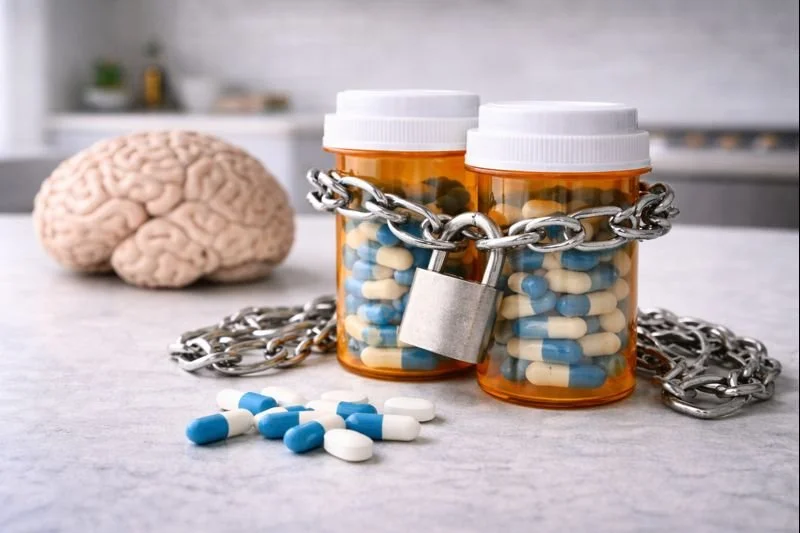Are Antidepressants Addictive? What You Need to Know
Many people starting antidepressants wonder: Are these medications addictive? Understanding how antidepressants work, their risks, and their benefits is key to making informed decisions about your mental health treatment.
At Dignity Brain Health, we provide expert psychiatric medication management via telehealth to adults throughout Massachusetts—including Boston, Brookline, Cambridge, Newton, Somerville, and Back Bay—as well as New Hampshire and Florida. If you are searching for psychiatric medication near me, a mental health nurse practitioner online, or want to understand how to get anxiety meds without therapy, this guide will clarify myths about antidepressant addiction and explain what to expect.
What Are Antidepressants and How Do They Work?
Antidepressants are medications used to treat depression, anxiety disorders, OCD, PTSD, and sometimes other conditions like chronic pain or ADHD.
Common Types of Antidepressants
Selective Serotonin Reuptake Inhibitors (SSRIs): e.g., fluoxetine, sertraline
Serotonin-Norepinephrine Reuptake Inhibitors (SNRIs): e.g., venlafaxine, duloxetine
Tricyclic Antidepressants (TCAs): older class, e.g., amitriptyline
Monoamine Oxidase Inhibitors (MAOIs): rarely used today
Atypical Antidepressants: e.g., bupropion (Wellbutrin)
These medications work by altering brain chemicals that regulate mood and anxiety.
Are Antidepressants Addictive?
The Short Answer: No
Antidepressants are not addictive in the way substances like opioids, benzodiazepines, or nicotine are. They do not cause cravings or compulsive use.
Unlike addictive drugs, antidepressants don’t produce a “high” or euphoria.
They do not activate brain reward pathways responsible for addiction.
What About Withdrawal or Discontinuation Symptoms?
Stopping antidepressants suddenly can cause uncomfortable discontinuation symptoms, sometimes called "withdrawal," but these are not the same as addiction.
Common discontinuation symptoms include:
Dizziness or lightheadedness
Flu-like symptoms
Irritability or mood swings
Electric shock sensations ("brain zaps")
Insomnia or vivid dreams
These symptoms typically resolve within days to weeks after stopping and can be minimized by tapering the dose gradually under medical supervision (Fava et al., 2015).
How Addiction Differs from Discontinuation
Are Any Psychiatric Medications Addictive?
Benzodiazepines (e.g., lorazepam, alprazolam) are addictive and should be used carefully.
Stimulants for ADHD (e.g., Adderall) have some abuse potential.
Antidepressants are generally safe and non-addictive.
Why Understanding This Matters
Fear of addiction may prevent people from starting or continuing antidepressant treatment — potentially worsening depression or anxiety.
Antidepressants can be life-changing and improve quality of life.
Knowing they are non-addictive helps reduce stigma and increases treatment adherence.
Telehealth Psychiatric Medication Management at Dignity Brain Health
We provide safe, convenient psychiatric medication management through telehealth for adults in Massachusetts, New Hampshire, and Florida.
What We Offer:
Comprehensive evaluations and diagnosis
Personalized medication plans and ongoing monitoring
Guidance on starting, tapering, and discontinuing medications safely
Genetic testing to optimize medication selection (Learn More)
Our providers serve Boston neighborhoods like Brookline, Cambridge, Newton, Somerville, and Back Bay, offering flexible scheduling and easy online booking.
Common Patient Questions
Can I get addicted to antidepressants?
No. Antidepressants do not cause addiction or cravings.
Will I experience withdrawal?
Discontinuation symptoms can occur if stopped suddenly but are manageable with gradual tapering.
How long does it take for antidepressants to work?
Most antidepressants take 4–6 weeks to show significant improvement.
Can I take antidepressants without therapy?
Yes, medication management alone is available, though therapy often enhances outcomes.
Local Mental Health Resources in Massachusetts
NAMI Massachusetts: Education and peer support https://www.namimass.org
Massachusetts Department of Mental Health: Public programs and resources
Leading psychiatric centers: Harvard Medical School, Mass General, McLean Hospital
Why Choose Dignity Brain Health?
Licensed psychiatric providers specializing in medication management
Telehealth care available statewide with focus on Boston metro
Evidence-based treatment plans tailored to you
Easy online appointment scheduling and follow-up
Genetic testing to customize medications (Learn More)
Meet our team on our About Us page.
Take the Next Step: Book Your Telehealth Appointment Today
If you’re concerned about antidepressants or considering treatment, get expert psychiatric care from home.
👉 Start your your online psychiatric medication consultation process now
References
Fava, G. A., Gatti, A., Belaise, C., Guidi, J., & Offidani, E. (2015). Withdrawal symptoms after selective serotonin reuptake inhibitor discontinuation: A systematic review. Psychotherapy and Psychosomatics, 84(2), 72–81. https://doi.org/10.1159/000365394
Horowitz, M. A., & Taylor, D. (2019). Tapering of SSRI treatment to mitigate withdrawal symptoms. The Lancet Psychiatry, 6(6), 538–546. https://doi.org/10.1016/S2215-0366(19)30032-X
Smith, K. E., & Cipriani, A. (2017). Antidepressants are not addictive: A narrative review of the evidence. Therapeutic Advances in Psychopharmacology, 7(6), 241–250. https://doi.org/10.1177/2045125317721675
Stein, D. J., Phillips, K. A., Bolton, D., Fulford, K. W., Sadler, J. Z., & Kendler, K. S. (2010). What is a mental/psychiatric disorder? From DSM-IV to DSM-V. Psychological Medicine, 40(11), 1759–1765. https://doi.org/10.1017/S003329171000070X


